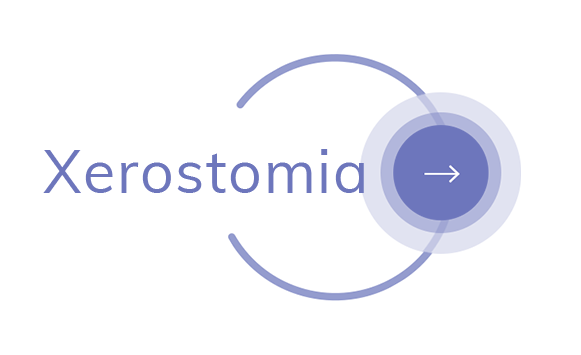Xerostomia
Dry mouth
Xerostomia is the subjective sensation of dry mouth due to a decrease in saliva, caused by impaired salivary gland function. The presence of saliva in the oral cavity is very important to avoid a microbial imbalance in the oral environment, which can lead to the onset of caries, gum disease, halitosis, or bad breath, etc.
Dry mouth
Xerostomia is the subjective sensation of dry mouth due to a decrease in saliva, caused by impaired salivary gland function. The presence of saliva in the oral cavity is very important to avoid a microbial imbalance in the oral environment, which can lead to the onset of caries, gum disease, halitosis, or bad breath, etc.

Reversible xerostomia
Characterised by registering residual glandular activity where salivary secretion can be stimulated or regulated. This type of xerostomising effect is produced by medications, stress, unbalanced diets and public speaking, etc.

Irreversible xerostomia
There is irreparable glandular damage that prevents proper functioning. This clinical picture can be found in patients diagnosed with Sjögren's syndrome or patients with head and neck cancer who receive large doses of radiation therapy.

- Public speaking: increases the need for salivation to help better vocalise words
- Stress, anxiety and depression: affect the central nervous system, and therefore, organs and glands throughout the body (including the salivary glands) are affected.
- Diabetes and other systemic diseases also affect the entire body, impairing gland function.
- Treatment with certain medications: antihistamines, antihypertensives, diuretics and cancer drugs, etc.
- Absence of teeth: causes a decrease in stimuli in the mouth and, as a result, saliva production drops.
- Unbalanced diet with excess carbohydrates and deficiency of fruits and vegetables.
- Smoking and alcohol consumption: salivary secretion may decrease, since these inhibit the transmission of nerve impulses.
The lack of moisture in the oral cavity can cause various clinical manifestations that decrease the quality of life of patients suffering from xerostomia.
- Dryness, redness, irritation and cracks in the soft tissues, facilitating the attack of opportunistic microorganisms.
- Inflammation of the mucous membranes (stomatitis) and of the gums (gingivitis).
- Presence of painful ulcerations and local infections caused by fungi such as candidiasis, cracked lips or halitosis.
- Pharyngitis, laryngitis, dyspepsia or constipation.
- Carious lesions and dental sensitivity.

There are multiple tests that are useful for the diagnosis of salivary gland diseases. It is important not to overlook clinical history and intra and extraoral clinical exams.
- Sialometry: measures the amount of saliva
- Salivary gland biopsy: used to observe the presence of inflammation and destruction of glandular tissue
- Ultrasound
- Magnetic resonance
- Computed tomography

Solutions
- Change, discontinue or reduce any xerostomising drugs being taken, if possible and, always after consulting with the doctor who has prescribed them.
- Determine whether the process that generates dry mouth is reversible or irreversible.
- Determine if glandular activity can still be stimulated mechanically, chemically or through taste.
- Use wetting agents, salivary substitutes and/or sialogogues. Humectants may be found with formulas containing betaine, allantoin, aloe vera, fluoride and xylitol, for daily oral hygiene, to moisturise the oral cavity. Salivary substitutes usually include the use of moisturisers such as water, milk, saline or, in more severe cases, the use of artificial saliva. Finally, in those cases where the salivary glands are functional, sialogogues, such as malic acid, can be used to stimulate saliva secretion naturally.
- Reinforce oral hygiene techniques, using a toothbrush with soft filaments, specific toothpastes and mouthwashes and moisturising gels, to help keep the mucosa lubricated.
- Visit your dentist regularly.